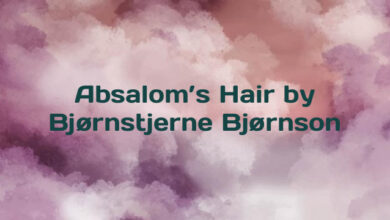
The Man Whom the Trees Loved by Algernon Blackwood
Chapter 2
Sanderson accordingly came down, and on the whole his short visit was a success. Why he came at all was a mystery to those who heard of it, for he never paid visits and was certainly not the kind of man to court a customer. There must have been something in Bittacy he liked.
Mrs. Bittacy was glad when he left. He brought no dress-suit for one thing, not even a dinner-jacket, and he wore very low collars with big balloon ties like a Frenchman, and let his hair grow longer than was nice, she felt. Not that these things were important, but that she considered them symptoms of something a little disordered. The ties were unnecessarily flowing.
For all that he was an interesting man, and, in spite of his eccentricities of dress and so forth, a gentleman. “Perhaps,” she reflected in her genuinely charitable heart, “he had other uses for the twenty guineas, an invalid sister or an old mother to support!” She had no notion of the cost of brushes, frames, paints, and canvases. Also she forgave him much for the sake of his beautiful eyes and his eager enthusiasm of manner. So many men of thirty were already blase.
Still, when the visit was over, she felt relieved. She said nothing about his coming a second time, and her husband, she was glad to notice, had likewise made no suggestion. For, truth to tell, the way the younger man engrossed the older, keeping him out for hours in the Forest, talking on the lawn in the blazing sun, and in the evenings when the damp of dusk came creeping out from the surrounding woods, all regardless of his age and usual habits, was not quite to her taste. Of course, Mr. Sanderson did not know how easily those attacks of Indian fever came back, but David surely might have told him.
They talked trees from morning to night. It stirred in her the old subconscious trail of dread, a trail that led ever into the darkness of big woods; and such feelings, as her early evangelical training taught her, were temptings. To regard them in any other way was to play with danger.
Her mind, as she watched these two, was charged with curious thoughts of dread she could not understand, yet feared the more on that account. The way they studied that old mangy cedar was a trifle unnecessary, unwise, she felt. It was disregarding the sense of proportion which deity had set upon the world for men’s safe guidance.
Even after dinner they smoked their cigars upon the low branches that swept down and touched the lawn, until at length she insisted on their coming in. Cedars, she had somewhere heard, were not safe after sundown; it was not wholesome to be too near them; to sleep beneath them was even dangerous, though what the precise danger was she had forgotten. The upas was the tree she really meant.
At any rate she summoned David in, and Sanderson came presently after him.
For a long time, before deciding on this peremptory step, she had watched them surreptitiously from the drawing-room window–her husband and her guest. The dusk enveloped them with its damp veil of gauze. She saw the glowing tips of their cigars, and heard the drone of voices. Bats flitted overhead, and big, silent moths whirred softly over the rhododendron blossoms. And it came suddenly to her, while she watched, that her husband had somehow altered these last few days–since Mr. Sanderson’s arrival in fact. A change had come over him, though what it was she could not say. She hesitated, indeed, to search. That was the instinctive dread operating in her. Provided it passed she would rather not know. Small things, of course, she noticed; small outward signs. He had neglected The Times for one thing, left off his speckled waistcoats for another. He was absent-minded sometimes; showed vagueness in practical details where hitherto he showed decision. And–he had begun to talk in his sleep again.
These and a dozen other small peculiarities came suddenly upon her with the rush of a combined attack. They brought with them a faint distress that made her shiver. Momentarily her mind was startled, then confused, as her eyes picked out the shadowy figures in the dusk, the cedar covering them, the Forest close at their backs. And then, before she could think, or seek internal guidance as her habit was, this whisper, muffled and very hurried, ran across her brain: “It’s Mr. Sanderson. Call David in at once!”
And she had done so. Her shrill voice crossed the lawn and died away into the Forest, quickly smothered. No echo followed it. The sound fell dead against the rampart of a thousand listening trees.
“The damp is so very penetrating, even in summer,” she murmured when they came obediently. She was half surprised at her open audacity, half repentant. They came so meekly at her call. “And my husband is sensitive to fever from the East. No, please do not throw away your cigars. We can sit by the open window and enjoy the evening while you smoke.”
She was very talkative for a moment; subconscious excitement was the cause.
“It is so still–so wonderfully still,” she went on, as no one spoke; “so peaceful, and the air so very sweet … and God is always near to those who need His aid.” The words slipped out before she realized quite what she was saying, yet fortunately, in time to lower her voice, for no one heard them. They were, perhaps, an instinctive expression of relief. It flustered her that she could have said the thing at all.
Sanderson brought her shawl and helped to arrange the chairs; she thanked him in her old-fashioned, gentle way, declining the lamps which he had offered to light. “They attract the moths and insects so, I think!”
The three of them sat there in the gloaming. Mr. Bittacy’s white moustache and his wife’s yellow shawl gleaming at either end of the little horseshoe, Sanderson with his wild black hair and shining eyes midway between them. The painter went on talking softly, continuing evidently the conversation begun with his host beneath the cedar. Mrs. Bittacy, on her guard, listened–uneasily.
“For trees, you see, rather conceal themselves in daylight. They reveal themselves fully only after sunset. I never know a tree,” he bowed here slightly towards the lady as though to apologize for something he felt she would not quite understand or like, “until I’ve seen it in the night. Your cedar, for instance,” looking towards her husband again so that Mrs. Bittacy caught the gleaming of his turned eyes, “I failed with badly at first, because I did it in the morning. You shall see to-morrow what I mean–that first sketch is upstairs in my portfolio; it’s quite another tree to the one you bought. That view”–he leaned forward, lowering his voice–“I caught one morning about two o’clock in very faint moonlight and the stars. I saw the naked being of the thing–“
“You mean that you went out, Mr. Sanderson, at that hour?” the old lady asked with astonishment and mild rebuke. She did not care particularly for his choice of adjectives either.
“I fear it was rather a liberty to take in another’s house, perhaps,” he answered courteously. “But, having chanced to wake, I saw the tree from my window, and made my way downstairs.”
“It’s a wonder Boxer didn’t bit you; he sleeps loose in the hall,” she said.
“On the contrary. The dog came out with me. I hope,” he added, “the noise didn’t disturb you, though it’s rather late to say so. I feel quite guilty.” His white teeth showed in the dusk as he smiled. A smell of earth and flowers stole in through the window on a breath of wandering air.
Mrs. Bittacy said nothing at the moment. “We both sleep like tops,” put in her husband, laughing. “You’re a courageous man, though, Sanderson, and, by Jove, the picture justifies you. Few artist would have taken so much trouble, though I read once that Holman Hunt, Rossetti, or some one of that lot, painted all night in his orchard to get an effect of moonlight that he wanted.”
He chattered on. His wife was glad to hear his voice; it made her feel more easy in her mind. But presently the other held the floor again, and her thoughts grew darkened and afraid. Instinctively she feared the influence on her husband. The mystery and wonder that lie in woods, in forests, in great gatherings of trees everywhere, seemed so real and present while he talked.
“The Night transfigures all things in a way,” he was saying; “but nothing so searchingly as trees. From behind a veil that sunlight hangs before them in the day they emerge and show themselves. Even buildings do that–in a measure–but trees particularly. In the daytime they sleep; at night they wake, they manifest, turn active–live. You remember,” turning politely again in the direction of his hostess, “how clearly Henley understood that?”
“That socialist person, you mean?” asked the lady. Her tone and accent made the substantive sound criminal. It almost hissed, the way she uttered it.
“The poet, yes,” replied the artist tactfully, “the friend of Stevenson, you remember, Stevenson who wrote those charming children’s verses.”
He quoted in a low voice the lines he meant. It was, for once, the time, the place, and the setting all together. The words floated out across the lawn towards the wall of blue darkness where the big Forest swept the little garden with its league-long curve that was like the shore-line of a sea. A wave of distant sound that was like surf accompanied his voice, as though the wind was fain to listen too:
Not to the staring Day, For all the importunate questionings he pursues In his big, violent voice, Shall those mild things of bulk and multitude, The trees--God's sentinels ... Yield of their huge, unutterable selves But at the word Of the ancient, sacerdotal Night, Night of many secrets, whose effect-- Transfiguring, hierophantic, dread-- Themselves alone may fully apprehend, They tremble and are changed: In each the uncouth, individual soul Looms forth and glooms Essential, and, their bodily presences Touched with inordinate significance, Wearing the darkness like a livery Of some mysterious and tremendous guild, They brood--they menace--they appall.
The voice of Mrs. Bittacy presently broke the silence that followed.
“I like that part about God’s sentinels,” she murmured. There was no sharpness in her tone; it was hushed and quiet. The truth, so musically uttered, muted her shrill objections though it had not lessened her alarm. Her husband made no comment; his cigar, she noticed, had gone out.
“And old trees in particular,” continued the artist, as though to himself, “have very definite personalities. You can offend, wound, please them; the moment you stand within their shade you feel whether they come out to you, or whether they withdraw.” He turned abruptly towards his host. “You know that singular essay of Prentice Mulford’s, no doubt ‘God in the Trees’–extravagant perhaps, but yet with a fine true beauty in it? You’ve never read it, no?” he asked.
But it was Mrs. Bittacy who answered; her husband keeping his curious deep silence.
“I never did!” It fell like a drip of cold water from the face muffled in the yellow shawl; even a child could have supplied the remainder of the unspoken thought.
“Ah,” said Sanderson gently, “but there is ‘God’ in the trees. God in a very subtle aspect and sometimes–I have known the trees express it too–that which is not God–dark and terrible. Have you ever noticed, too, how clearly trees show what they want–choose their companions, at least? How beeches, for instance, allow no life too near them–birds or squirrels in their boughs, nor any growth beneath? The silence in the beech wood is quite terrifying often! And how pines like bilberry bushes at their feet and sometimes little oaks–all trees making a clear, deliberate choice, and holding firmly to it? Some trees obviously–it’s very strange and marked–seem to prefer the human.”
The old lady sat up crackling, for this was more than she could permit. Her stiff silk dress emitted little sharp reports.
“We know,” she answered, “that He was said to have walked in the garden in the cool of the evening”–the gulp betrayed the effort that it cost her–“but we are nowhere told that He hid in the trees, or anything like that. Trees, after all, we must remember, are only large vegetables.”
“True,” was the soft answer, “but in everything that grows, has life, that is, there’s mystery past all finding out. The wonder that lies hidden in our own souls lies also hidden, I venture to assert, in the stupidity and silence of a mere potato.”
The observation was not meant to be amusing. It was not amusing. No one laughed. On the contrary, the words conveyed in too literal a sense the feeling that haunted all that conversation. Each one in his own way realized–with beauty, with wonder, with alarm–that the talk had somehow brought the whole vegetable kingdom nearer to that of man. Some link had been established between the two. It was not wise, with that great Forest listening at their very doors, to speak so plainly. The forest edged up closer while they did so.
And Mrs. Bittacy, anxious to interrupt the horrid spell, broke suddenly in upon it with a matter-of-fact suggestion. She did not like her husband’s prolonged silence, stillness. He seemed so negative–so changed.
“David,” she said, raising her voice, “I think you’re feeling the dampness. It’s grown chilly. The fever comes so suddenly, you know, and it might be wide to take the tincture. I’ll go and get it, dear, at once. It’s better.” And before he could object she had left the room to bring the homeopathic dose that she believed in, and that, to please her, he swallowed by the tumbler-full from week to week.
And the moment the door closed behind her, Sanderson began again, though now in quite a different tone. Mr. Bittacy sat up in his chair. The two men obviously resumed the conversation–the real conversation interrupted beneath the cedar–and left aside the sham one which was so much dust merely thrown in the old lady’s eyes.
“Trees love you, that’s the fact,” he said earnestly. “Your service to them all these years abroad has made them know you.”
“Know me?”
“Made them, yes,”–he paused a moment, then added,–“made them aware of your presence; aware of a force outside themselves that deliberately seeks their welfare, don’t you see?”
“By Jove, Sanderson–!” This put into plain language actual sensations he had felt, yet had never dared to phrase in words before. “They get into touch with me, as it were?” he ventured, laughing at his own sentence, yet laughing only with his lips.
“Exactly,” was the quick, emphatic reply. “They seek to blend with something they feel instinctively to be good for them, helpful to their essential beings, encouraging to their best expression–their life.”
“Good Lord, Sir!” Bittacy heard himself saying, “but you’re putting my own thoughts into words. D’you know, I’ve felt something like that for years. As though–” he looked round to make sure his wife was not there, then finished the sentence–“as though the trees were after me!”
“‘Amalgamate’ seems the best word, perhaps,” said Sanderson slowly. “They would draw you to themselves. Good forces, you see, always seek to merge; evil to separate; that’s why Good in the end must always win the day–everywhere. The accumulation in the long run becomes overwhelming. Evil tends to separation, dissolution, death. The comradeship of trees, their instinct to run together, is a vital symbol. Trees in a mass are good; alone, you may take it generally, are–well, dangerous. Look at a monkey-puzzler, or better still, a holly. Look at it, watch it, understand it. Did you ever see more plainly an evil thought made visible? They’re wicked. Beautiful too, oh yes! There’s a strange, miscalculated beauty often in evil–“
“That cedar, then–?”
“Not evil, no; but alien, rather. Cedars grow in forests all together. The poor thing has drifted, that is all.”
They were getting rather deep. Sanderson, talking against time, spoke so fast. It was too condensed. Bittacy hardly followed that last bit. His mind floundered among his own less definite, less sorted thoughts, till presently another sentence from the artist startled him into attention again.
“That cedar will protect you here, though, because you both have humanized it by your thinking so lovingly of its presence. The others can’t get past it, as it were.”
“Protect me!” he exclaimed. “Protect me from their love?”
Sanderson laughed. “We’re getting rather mixed,” he said; “we’re talking of one thing in the terms of another really. But what I mean is–you see–that their love for you, their ‘awareness’ of your personality and presence involves the idea of winning you–across the border–into themselves–into their world of living. It means, in a way, taking you over.”
The ideas the artist started in his mind ran furious wild races to and fro. It was like a maze sprung suddenly into movement. The whirling of the intricate lines bewildered him. They went so fast, leaving but half an explanation of their goal. He followed first one, then another, but a new one always dashed across to intercept before he could get anywhere.
“But India,” he said, presently in a lower voice, “India is so far away–from this little English forest. The trees, too, are utterly different for one thing?”
The rustle of skirts warned of Mrs. Bittacy’s approach. This was a sentence he could turn round another way in case she came up and pressed for explanation.
“There is communion among trees all the world over,” was the strange quick reply. “They always know.”
“They always know! You think then–?”
“The winds, you see–the great, swift carriers! They have their ancient rights of way about the world. An easterly wind, for instance, carrying on stage by stage as it were–linking dropped messages and meanings from land to land like the birds–an easterly wind–“
Mrs. Bittacy swept in upon them with the tumbler–
“There, David,” she said, “that will ward off any beginnings of attack. Just a spoonful, dear. Oh, oh! not all !” for he had swallowed half the contents at a single gulp as usual; “another dose before you go to bed, and the balance in the morning, first thing when you wake.”
She turned to her guest, who put the tumbler down for her upon a table at his elbow. She had heard them speak of the east wind. She emphasized the warning she had misinterpreted. The private part of the conversation came to an abrupt end.
“It is the one thing that upsets him more than any other–an east wind,” she said, “and I am glad, Mr. Sanderson, to hear you think so too.”
Chapter 3
A deep hush followed, in the middle of which an owl was heard calling its muffled note in the forest. A big moth whirred with a soft collision against one of the windows. Mrs. Bittacy started slightly, but no one spoke. Above the trees the stars were faintly visible. From the distance came the barking of a dog.
Bittacy, relighting his cigar, broke the little spell of silence that had caught all three.
“It’s rather a comforting thought,” he said, throwing the match out of the window, “that life is about us everywhere, and that there is really no dividing line between what we call organic and inorganic.”
“The universe, yes,” said Sanderson, “is all one, really. We’re puzzled by the gaps we cannot see across, but as a fact, I suppose, there are no gaps at all.”
Mrs. Bittacy rustled ominously, holding her peace meanwhile. She feared long words she did not understand. Beelzebub lay hid among too many syllables.
“In trees and plants especially, there dreams an exquisite life that no one yet has proved unconscious.”
“Or conscious either, Mr. Sanderson,” she neatly interjected. “It’s only man that was made after His image, not shrubberies and things….”
Her husband interposed without delay.
“It is not necessary,” he explained suavely, “to say that they’re alive in the sense that we are alive. At the same time,” with an eye to his wife, “I see no harm in holding, dear, that all created things contain some measure of His life Who made them. It’s only beautiful to hold that He created nothing dead. We are not pantheists for all that!” he added soothingly.
“Oh, no! Not that, I hope!” The word alarmed her. It was worse than pope. Through her puzzled mind stole a stealthy, dangerous thing … like a panther.
“I like to think that even in decay there’s life,” the painter murmured. “The falling apart of rotten wood breeds sentiency, there’s force and motion in the falling of a dying leaf, in the breaking up and crumbling of everything indeed. And take an inert stone: it’s crammed with heat and weight and potencies of all sorts. What holds its particles together indeed? We understand it as little as gravity or why a needle always turns to the ‘North.’ Both things may be a mode of life….”
“You think a compass has a soul, Mr. Sanderson?” exclaimed the lady with a crackling of her silk flounces that conveyed a sense of outrage even more plainly than her tone. The artist smiled to himself in the darkness, but it was Bittacy who hastened to reply.
“Our friend merely suggests that these mysterious agencies,” he said quietly, “may be due to some kind of life we cannot understand. Why should water only run downhill? Why should trees grow at right angles to the surface of the ground and towards the sun? Why should the worlds spin for ever on their axes? Why should fire change the form of everything it touches without really destroying them? To say these things follow the law of their being explains nothing. Mr. Sanderson merely suggests–poetically, my dear, of course–that these may be manifestations of life, though life at a different stage to ours.”
“The ‘ breath of life,’ we read, ‘He breathed into them. These things do not breathe.” She said it with triumph.
Then Sanderson put in a word. But he spoke rather to himself or to his host than by way of serious rejoinder to the ruffled lady.
“But plants do breathe too, you know,” he said. “They breathe, they eat, they digest, they move about, and they adapt themselves to their environment as men and animals do. They have a nervous system too… at least a complex system of nuclei which have some of the qualities of nerve cells. They may have memory too. Certainly, they know definite action in response to stimulus. And though this may be physiological, no one has proved that it is only that, and not–psychological.”
He did not notice, apparently, the little gasp that was audible behind the yellow shawl. Bittacy cleared his throat, threw his extinguished cigar upon the lawn, crossed and recrossed his legs.
“And in trees,” continued the other, “behind a great forest, for instance,” pointing towards the woods, “may stand a rather splendid Entity that manifests through all the thousand individual trees–some huge collective life, quite as minutely and delicately organized as our own. It might merge and blend with ours under certain conditions, so that we could understand it by being it, for a time at least. It might even engulf human vitality into the immense whirlpool of its own vast dreaming life. The pull of a big forest on a man can be tremendous and utterly overwhelming.”
The mouth of Mrs. Bittacy was heard to close with a snap. Her shawl, and particularly her crackling dress, exhaled the protest that burned within her like a pain. She was too distressed to be overawed, but at the same time too confused ‘mid the litter of words and meanings half understood, to find immediate phrases she could use. Whatever the actual meaning of his language might be, however, and whatever subtle dangers lay concealed behind them meanwhile, they certainly wove a kind of gentle spell with the glimmering darkness that held all three delicately enmeshed there by that open window. The odors of dewy lawn, flowers, trees, and earth formed part of it.
“The moods,” he continued, “that people waken in us are due to their hidden life affecting our own. Deep calls to sleep. A person, for instance, joins you in an empty room: you both instantly change. The new arrival, though in silence, has caused a change of mood. May not the moods of Nature touch and stir us in virtue of a similar prerogative? The sea, the hills, the desert, wake passion, joy, terror, as the case may be; for a few, perhaps,” he glanced significantly at his host so that Mrs. Bittacy again caught the turning of his eyes, “emotions of a curious, flaming splendor that are quite nameless. Well … whence come these powers? Surely from nothing that is … dead! Does not the influence of a forest, its sway and strange ascendancy over certain minds, betray a direct manifestation of life? It lies otherwise beyond all explanation, this mysterious emanation of big woods. Some natures, of course, deliberately invite it. The authority of a host of trees,”–his voice grew almost solemn as he said the words–“is something not to be denied. One feels it here, I think, particularly.”
There was considerable tension in the air as he ceased speaking. Mr. Bittacy had not intended that the talk should go so far. They had drifted. He did not wish to see his wife unhappy or afraid, and he was aware–acutely so–that her feelings were stirred to a point he did not care about. Something in her, as he put it, was “working up” towards explosion.
He sought to generalize the conversation, diluting this accumulated emotion by spreading it.
“The sea is His and He made it,” he suggested vaguely, hoping Sanderson would take the hint, “and with the trees it is the same….”
“The whole gigantic vegetable kingdom, yes,” the artist took him up, “all at the service of man, for food, for shelter and for a thousand purposes of his daily life. Is it not striking what a lot of the globe they cover … exquisitely organized life, yet stationary, always ready to our had when we want them, never running away? But the taking them, for all that, not so easy. One man shrinks from picking flowers, another from cutting down trees. And, it’s curious that most of the forest tales and legends are dark, mysterious, and somewhat ill-omened. The forest-beings are rarely gay and harmless. The forest life was felt as terrible. Tree-worship still survives to-day. Wood-cutters… those who take the life of trees… you see a race of haunted men….”
He stopped abruptly, a singular catch in his voice. Bittacy felt something even before the sentences were over. His wife, he knew, felt it still more strongly. For it was in the middle of the heavy silence following upon these last remarks, that Mrs. Bittacy, rising with a violent abruptness from her chair, drew the attention of the others to something moving towards them across the lawn. It came silently. In outline it was large and curiously spread. It rose high, too, for the sky above the shrubberies, still pale gold from the sunset, was dimmed by its passage. She declared afterwards that it move in “looping circles,” but what she perhaps meant to convey was “spirals.”
She screamed faintly. “It’s come at last! And it’s you that brought it!”
She turned excitedly, half afraid, half angry, to Sanderson. With a breathless sort of gasp she said it, politeness all forgotten. “I knew it … if you went on. I knew it. Oh! Oh!” And she cried again, “Your talking has brought it out!” The terror that shook her voice was rather dreadful.
But the confusion of her vehement words passed unnoticed in the first surprise they caused. For a moment nothing happened.
“What is it you think you see, my dear?” asked her husband, startled. Sanderson said nothing. All three leaned forward, the men still sitting, but Mrs. Bittacy had rushed hurriedly to the window, placing herself of a purpose, as it seemed, between her husband and the lawn. She pointed. Her little hand made a silhouette against the sky, the yellow shawl hanging from the arm like a cloud.
“Beyond the cedar–between it and the lilacs.” The voice had lost its shrillness; it was thin and hushed. “There … now you see it going round upon itself again–going back, thank God!… going back to the Forest.” It sank to a whisper, shaking. She repeated, with a great dropping sigh of relief–“Thank God! I thought … at first … it was coming here … to us!… David … to you !”
She stepped back from the window, her movements confused, feeling in the darkness for the support of a chair, and finding her husband’s outstretched hand instead. “Hold me, dear, hold me, please … tight. Do not let me go.” She was in what he called afterwards “a regular state.” He drew her firmly down upon her chair again.
“Smoke, Sophie, my dear,” he said quickly, trying to make his voice calm and natural. “I see it, yes. It’s smoke blowing over from the gardener’s cottage….”
“But, David,”–and there was a new horror in her whisper now–“it made a noise. It makes it still. I hear it swishing.” Some such word she used–swishing, sishing, rushing, or something of the kind. “David, I’m very frightened. It’s something awful! That man has called it out…!”
“Hush, hush,” whispered her husband. He stroked her trembling hand beside him.
“It is in the wind,” said Sanderson, speaking for the first time, very quietly. The expression on his face was not visible in the gloom, but his voice was soft and unafraid. At the sound of it, Mrs. Bittacy started violently again. Bittacy drew his chair a little forward to obstruct her view of him. He felt bewildered himself, a little, hardly knowing quite what to say or do. It was all so very curious and sudden.
But Mrs. Bittacy was badly frightened. It seemed to her that what she saw came from the enveloping forest just beyond their little garden. It emerged in a sort of secret way, moving towards them as with a purpose, stealthily, difficultly. Then something stopped it. It could not advance beyond the cedar. The cedar–this impression remained with her afterwards too–prevented, kept it back. Like a rising sea the Forest had surged a moment in their direction through the covering darkness, and this visible movement was its first wave. Thus to her mind it seemed… like that mysterious turn of the tide that used to frighten and mystify her in childhood on the sands. The outward surge of some enormous Power was what she felt… something to which every instinct in her being rose in opposition because it threatened her and hers. In that moment she realized the Personality of the Forest… menacing.
In the stumbling movement that she made away from the window and towards the bell she barely caught the sentence Sanderson–or was it her husband?–murmured to himself: “It came because we talked of it; our thinking made it aware of us and brought it out. But the cedar stops it. It cannot cross the lawn, you see….”
All three were standing now, and her husband’s voice broke in with authority while his wife’s fingers touched the bell.
“My dear, I should not say anything to Thompson.” The anxiety he felt was manifest in his voice, but his outward composure had returned. “The gardener can go….”
Then Sanderson cut him short. “Allow me,” he said quickly. “I’ll see if anything’s wrong.” And before either of them could answer or object, he was gone, leaping out by the open window. They saw his figure vanish with a run across the lawn into the darkness.
A moment later the maid entered, in answer to the bell, and with her came the loud barking of the terrier from the hall.
“The lamps,” said her master shortly, and as she softly closed the door behind her, they heard the wind pass with a mournful sound of singing round the outer walls. A rustle of foliage from the distance passed within it.
“You see, the wind is rising. It was the wind!” He put a comforting arm about her, distressed to feel that she was trembling. But he knew that he was trembling too, though with a kind of odd elation rather than alarm. “And it was smoke that you saw coming from Stride’s cottage, or from the rubbish heaps he’s been burning in the kitchen garden. The noise we heard was the branches rustling in the wind. Why should you be so nervous?”
A thin whispering voice answered him:
“I was afraid for you, dear. Something frightened me for you. That man makes me feel so uneasy and uncomfortable for his influence upon you. It’s very foolish, I know. I think… I’m tired; I feel so overwrought and restless.” The words poured out in a hurried jumble and she kept turning to the window while she spoke.
“The strain of having a visitor,” he said soothingly, “has taxed you. We’re so unused to having people in the house. He goes to-morrow.” He warmed her cold hands between his own, stroking them tenderly. More, for the life of him, he could not say or do. The joy of a strange, internal excitement made his heart beat faster. He knew not what it was. He knew only, perhaps, whence it came.
She peered close into his face through the gloom, and said a curious thing. “I thought, David, for a moment… you seemed… different. My nerves are all on edge to-night.” She made no further reference to her husband’s visitor.
A sound of footsteps from the lawn warned of Sanderson’s return, as he answered quickly in a lowered tone–“There’s no need to be afraid on my account, dear girl. There’s nothing wrong with me. I assure you; I never felt so well and happy in my life.”
Thompson came in with the lamps and brightness, and scarcely had she gone again when Sanderson in turn was seen climbing through the window.
“There’s nothing,” he said lightly, as he closed it behind him. “Somebody’s been burning leaves, and the smoke is drifting a little through the trees. The wind,” he added, glancing at his host a moment significantly, but in so discreet a way that Mrs. Bittacy did not observe it, “the wind, too, has begun to roar… in the Forest… further out.”
But Mrs. Bittacy noticed about him two things which increased her uneasiness. She noticed the shining of his eyes, because a similar light had suddenly come into her husband’s; and she noticed, too, the apparent depth of meaning he put into those simple words that “the wind had begun to roar in the Forest …further out.” Her mind retained the disagreeable impression that he meant more than he said. In his tone lay quite another implication. It was not actually “wind” he spoke of, and it would not remain “further out”…rather, it was coming in. Another impression she got too–still more unwelcome–was that her husband understood his hidden meaning.




